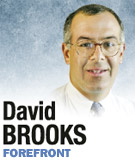Subscriber Benefit
As a subscriber you can listen to articles at work, in the car, or while you work out. Subscribe Now
 Several years ago, the investment banks and consulting firms decided it was better to hire a supremely gifted 22-year-old than a moderately gifted 40-year-old who wanted to go home to his family. To attract these young superstars, the firms set up training programs that offered recent college graduates great salaries, practical skills and interesting life experiences.
Several years ago, the investment banks and consulting firms decided it was better to hire a supremely gifted 22-year-old than a moderately gifted 40-year-old who wanted to go home to his family. To attract these young superstars, the firms set up training programs that offered recent college graduates great salaries, practical skills and interesting life experiences.
Top students at elite universities are now showered with these opportunities. This year, Rob Reich, a Stanford political science professor (not the former labor secretary, the other one), held a terrific online discussion on why so many elite students go into finance and consulting and whether this is a good thing.
Many recent Stanford grads ardently defended the finance path. One new investment banker wrote that he’s learning how the crude oil market works, meaning he now knows about Iran’s relationship to Russia, the cultural dynamics in Nigeria and many other things.
A Ph.D. student argued that these private sector firms do a lot more to alleviate poverty than nongovernmental organizations. Look at how global investment has reduced poverty in China.
Many of these students seem to have a blinkered view of their options. There’s crass but affluent investment banking. There’s the poor but noble not-for-profit world. And then there is the world of high-tech startups, which magically provides money and coolness simultaneously. But there was little interest in or awareness of the ministry, the military, the academy, government service or the zillion other sectors.
Furthermore, few students showed any interest in working for a company that actually makes products. It sometimes seems that good students at schools in blue states go into service capitalism (consulting and finance) while good students in red states go into production capitalism (Procter & Gamble, John Deere, AutoZone).
The discussion also reinforced a thought I’ve had in many other contexts: that community service has become a patch for morality. Many people today have not been given vocabularies to talk about what virtue is, what character consists of, and in which way excellence lies, so they just talk about community service, figuring that if you are doing the sort of work that Bono celebrates, then you must be a good person.
Let’s put it differently. Many people today find it easy to use the vocabulary of entrepreneurialism, whether they are in business or social entrepreneurs. This is a utilitarian vocabulary. How can I serve the greatest number? How can I most productively apply my talents to the problems of the world? It’s about resource allocation.
People are less good at using the vocabulary of moral evaluation, which is less about what sort of career path you choose than what sort of person you are.
In whatever field you go into, you will face greed, frustration and failure. You may find your life challenged by depression, alcoholism, infidelity, your own stupidity and self-indulgence. So how should you structure your soul to prepare for this? Simply working at Amnesty International instead of McKinsey is not necessarily going to help you with these primal character tests.
Furthermore, around what ultimate purpose should your life revolve? Are you capable of heroic self-sacrifice or is life just a series of achievement hoops? These, too, are not analytic questions about what to do. They require literary distinctions and moral evaluations.
When I read the Stanford discussion thread, I saw young people with deep moral yearnings. But they tended to convert moral questions into resource allocation questions; questions about how to be into questions about what to do.
It’s worth noting that you can devote your life to community service and be a total schmuck. You can spend your life on Wall Street and be a hero. Understanding heroism and schmuckdom requires fewer Excel spreadsheets, more Dostoyevsky and the Book of Job.•
__________
Brooks is a New York Times columnist. Send comments on this column to [email protected].
Please enable JavaScript to view this content.
